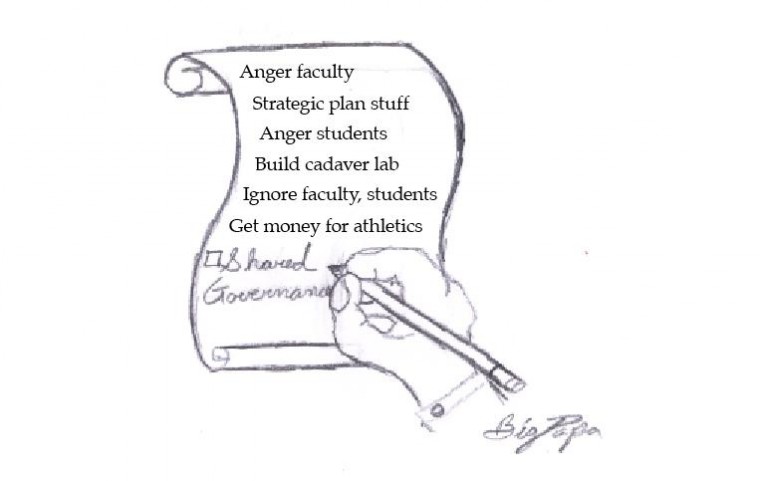Failed leadership continues here
It’s been three years since an accrediting team from the Higher Learning Commission visited Missouri Southern.
The HLC renewed the University’s accreditation for 10 years but found two glaring issues: strategic planning and shared governance.
Now, two consultants will visit campus April 4-5 to measure progress we’ve made in building a plan for the future and including faculty and staff in deciding the goals and objectives for this University.
And we’re not ready.
Sure, the strategic plan has been completed and 1,000 copies of the document have been printed and distributed. This will guide Southern for the next five years.
But with to shared governance, work remains.
Why?
Because this administration hasn’t done the necessary work to prepare for the HLC focused visit.
During the annual Board of Governors retreat last month, the strategic plan and shared governance were hot topics of discussion.
And while the Board was impressed with glossy copies of the strategic plan roadmap, the news regarding shared governance was puzzling.
Vice President for Academic Affairs AJ Anglin told Governors that when his predecessor, Dr. Brad Kleindl, took over the position after the quick resignation of Dr. Jack Oakes, Kleindl decided to focus on strategic planning and the shared governance plan sat idle for a year.
An entire year.
To make matters worse, Anglin said after a few months on the job he realized the shared governance process had not involved either the Faculty Senate or Staff Senate.
“You need to know the last four months or so we’ve been rewinding the clock because we skipped two incredibly important groups of ownership,” Anglin told the Board.
How in the world did this University blow off one of two key issues its accrediting agency told the school to improve?
University President Bruce Speck arrived just a few months before that 2008 HLC visit. He’s not to blame for their findings regarding strategic planning and shared governance.
But for three years now he has been the man in charge of making sure this University fixes these major problems and doesn’t risk its accreditation.
And now here we are, days before the consultants arrive, and despite three years of work, a shared governance plan hasn’t been completed.
Yes, there has been great turnover in the administration and vice presidents for academic affairs have led the charge to meet the HLC’s demands.
But the buck stops with Speck, and as president of this institution, he is directly responsible for the work of his vice presidents and the lack of work done on shared governance.
What are we going to tell the consultants? How are we going to explain sitting idle for a year and then not even including the Faculty Senate and Staff Senate until four months before their visit?
This is just one more example of Speck’s failed leadership of this University.
Your donation will support the student journalists of Missouri Southern State University. Your contribution will allow us to purchase equipment and cover our annual website hosting costs.




























